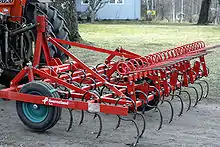harrow
See also: Harrow
English
WOTD – 23 January 2012

Harrow
Pronunciation
- (UK) IPA(key): /ˈhæɹəʊ/
- (US, Mary–marry–merry distinction) IPA(key): /ˈhæɹoʊ/
- (US, Mary–marry–merry merger) IPA(key): /ˈhɛɹoʊ/
(Mary–marry–merry distinction)Audio (US) (file) - Rhymes: -æɹəʊ
Etymology 1
From Middle English harow, harowe, haru, harwe, from Old English *hearwe or *hearġe (perhaps ultimately cognate with harvest), or from Old Norse harfr/herfi[1]; compare Danish harve (“harrow”), Dutch hark (“rake”). Akin to Latin carpere.
Noun
harrow (plural harrows)
- A device consisting of a heavy framework having several disks or teeth in a row, which is dragged across ploughed land to smooth or break up the soil, to remove weeds or cover seeds; a harrow plow.
- 1918, Louise & Aylmer Maude, trans. Leo Tolstoy, Anna Karenina, Oxford 1998, p. 153:
- He sent for the carpenter, who was under contract to be with the threshing-machine, but it turned out that he was mending the harrows, which should have been mended the week before Lent.
- 1960, P. G. Wodehouse, Jeeves in the Offing, chapter X:
- “It may be fun for her,” I said with one of my bitter laughs, “but it isn't so diverting for the unfortunate toads beneath the harrow whom she plunges so ruthlessly in the soup.”
- 1969, Bessie Head, When Rain Clouds Gather, Heinemann 1995, p. 28:
- Part of your job would be to learn tractor ploughing and the use of planters, harrows, and cultivators.
- 1918, Louise & Aylmer Maude, trans. Leo Tolstoy, Anna Karenina, Oxford 1998, p. 153:
- (military) An obstacle formed by turning an ordinary harrow upside down, the frame being buried.
Translations
device
|
|
See also
Verb
harrow (third-person singular simple present harrows, present participle harrowing, simple past and past participle harrowed)
- (transitive) To drag a harrow over; to break up with a harrow.
- Bible, Job xxxix. 10
- Will he harrow the valleys after thee?
- 1719 Daniel Defoe, Robinson Crusoe
- When the corn was sown, I had no harrow, but was forced to go over it myself, and drag a great heavy bough of a tree over it, to scratch it, as it may be called, rather than rake or harrow it.
- Bible, Job xxxix. 10
- (transitive) To traumatize or disturb; to frighten or torment.
- The headless horseman harrowed Ichabod Crane as he tried to reach the bridge.
- (transitive) To break or tear, as if with a harrow; to wound; to lacerate; to torment or distress; to vex.
- Rowe
- my aged muscles harrowed up with whips
- Shakespeare
- I could a tale unfold, whose lightest word / Would harrow up thy soul.
- Rowe
Derived terms
Translations
drag a harrow over
|
|
traumatise, frighten
|
Etymology 2
From Middle English harrow, harrowe, haro, from Old French haro, harou, harau, harol, from Frankish *harot, *hara (“here; hither”), akin to Old Saxon herod, Old High German herot, Middle Dutch hare.
Interjection
harrow
This article is issued from Wiktionary. The text is licensed under Creative Commons - Attribution - Sharealike. Additional terms may apply for the media files.